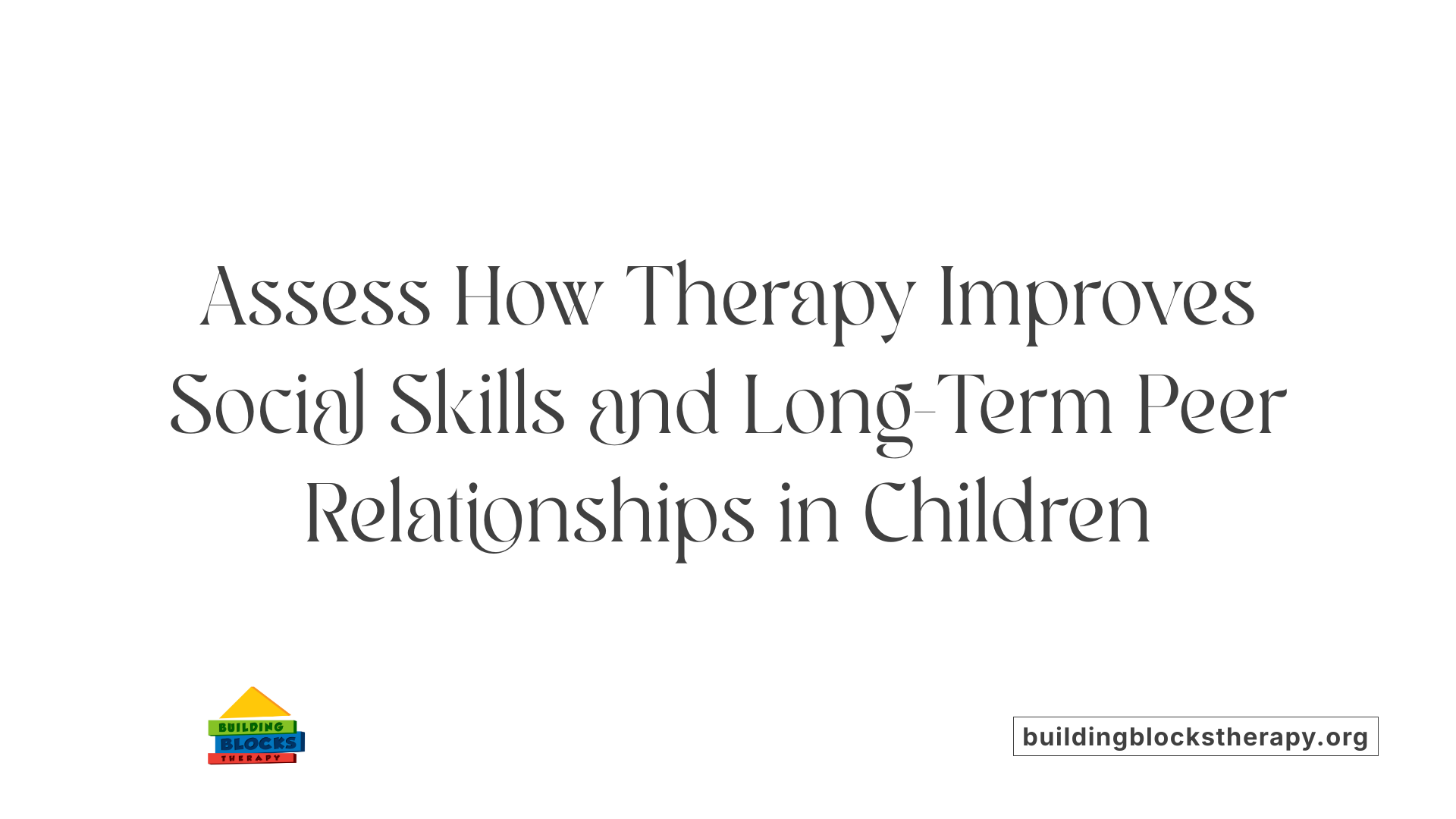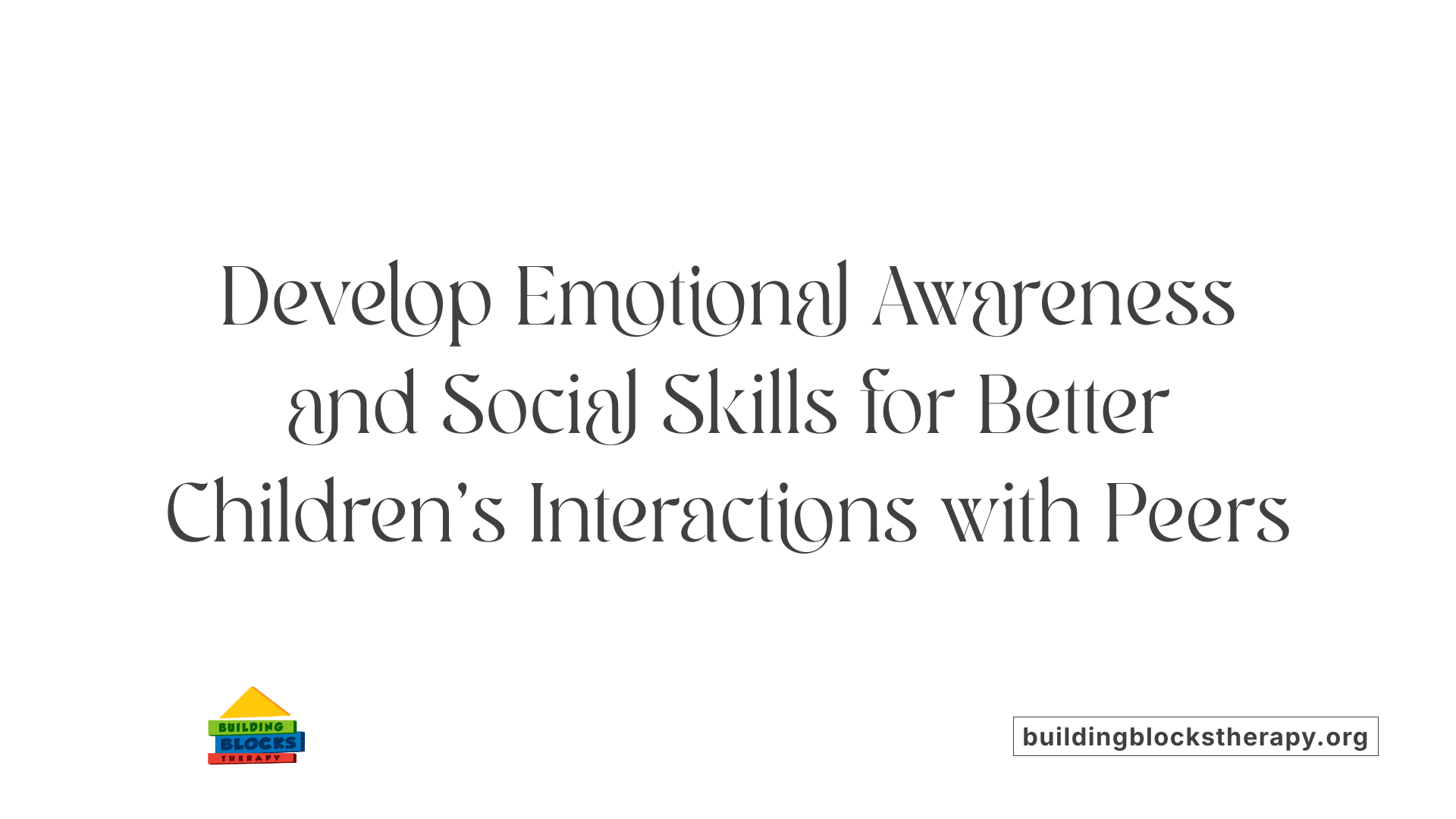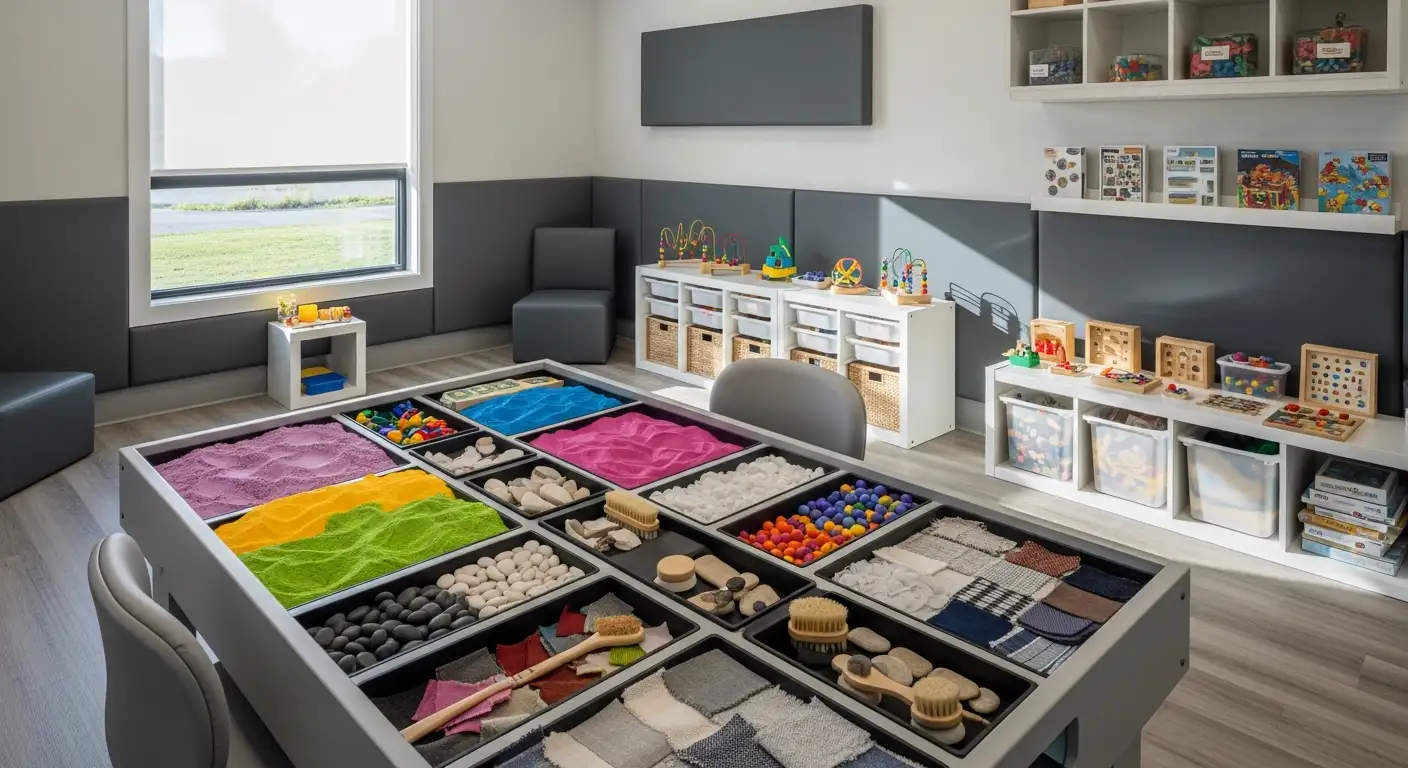Introduction: The Power of Therapeutic Support in Children's Social Development
Children often face challenges when it comes to social interactions, which can impact their emotional wellbeing and future relationships. Pediatric therapy plays a vital role in helping children develop the communication and social skills necessary for successful peer interactions. By creating structured and supportive environments, therapy provides children with opportunities to practice, learn, and refine their social behaviors, promoting confidence and resilience.
Understanding Social Difficulties in Children and How Therapy Addresses Them

What are the signs of social difficulties in children, and how does therapy address them?
Children experiencing social challenges often display noticeable signs that can indicate underlying issues. These signs include withdrawal from social activities, difficulty making or maintaining friendships, and limited or inappropriate nonverbal communication such as avoiding eye contact, showing flat facial expressions, or exhibiting awkward body language. Some children might struggle to interpret social cues like facial expressions, tone of voice, or gestures, making typical social interactions confusing for them.
In addition to communication issues, children with social difficulties might exhibit emotional outbursts or become easily overwhelmed in social settings. Anxiety is also common, especially in new or unfamiliar environments, leading to reluctance or refusal to participate in peer activities. These children may show a lack of interest in engaging with their peers or prefer solitary activities.
Therapeutic approaches offer targeted interventions to help children overcome these challenges. For instance, social stories are used to teach appropriate social behavior through relatable scenarios, helping children understand what to expect and how to respond in various situations. Role-playing exercises enable children to practice social interactions in a safe, controlled environment, building their confidence and social skills.
Peer interaction groups and social skills groups facilitate real-world practice, encouraging children to communicate, cooperate, and resolve conflicts with classmates and peers. Techniques such as play therapy incorporate natural, engaging activities that promote understanding of social cues and emotional expression.
Early detection and intervention are vital for improving social abilities. When diagnosed early, children can benefit from customized plans that boost social confidence, reduce anxiety, and foster positive interactions. Parental and caregiver involvement plays a crucial role by modeling appropriate social behaviors at home and reinforcing skills learned in therapy.
Overall, therapy helps children develop essential skills such as emotional regulation, understanding social cues, and effective communication. These improvements create a foundation for healthier peer relationships, greater self-confidence, and improved emotional well-being, supporting children as they grow and navigate social environments.
Therapeutic Strategies That Enhance Social Skills

How does therapy support children in developing social confidence and peer relationships?
Therapy plays a vital role in helping children develop social confidence and establish meaningful peer relationships. Through a variety of targeted methods, children learn and practice essential social skills such as effective communication, empathy, and emotional regulation.
Play-based activities are among the most effective tools used in therapy. Play therapy encourages children to understand social cues and boundaries in a natural setting. Using activities like cooperative games, children learn the importance of turn-taking, sharing, and collaboration—skills that are foundational for healthy interactions.
Social skills groups and structured activities create safe environments where children can practice interacting with peers. These settings promote teamwork, problem-solving, and conflict resolution, all while nurturing emotional intelligence and confidence. Sharing experiences in these groups also helps children develop empathy and deepen emotional connections.
Role-playing and social stories are common techniques used to teach children how to respond in different social situations. Role-playing allows children to simulate real-life interactions, boosting their confidence in initiating conversations and managing disagreements.
Emotion recognition exercises, such as identifying feelings through pictures or facial expressions, help children understand and regulate their emotions better. This awareness is crucial for building trust and effective communication in friendships.
Interventions like Applied Behavior Analysis (ABA) therapy and cognitive-behavioral approaches focus on reinforcing positive behaviors and skills. These methods involve teaching specific social behaviors, such as making eye contact, responding appropriately to questions, and understanding social cues.
Therapeutic programs also emphasize the importance of generalizing skills across different environments – school, home, and community. This ensures that children can apply what they learn consistently, fostering greater independence and social adaptability.
Furthermore, therapy addresses emotional challenges such as anxiety or depression, which can hinder social engagement. Improving self-esteem and resilience encourages children to take social risks and build friendships.
Summary of methods used to improve social confidence:
| Strategy | Description | Purpose |
|---|---|---|
| Play therapy | Activities and games to facilitate emotional and social learning | Develop social cues and boundaries |
| Social skills groups | Peer group sessions promoting practice of communication and teamwork | Build friendships and social confidence |
| Role-playing and social stories | Simulated scenarios to rehearse real-world social interactions | Increase comfort in social situations |
| Emotion recognition exercises | Identifying and understanding feelings through visual aids | Enhance emotional awareness and regulation |
| ABA and Cognitive Behavioral Therapies | Behavior-specific interventions focused on social skills reinforcement | Improve specific social behaviors and responses |
Effective therapy programs provide children with comprehensive tools to interpret social cues, regulate impulses, and develop positive relationships. Over time, these interventions foster greater social confidence and resilience, paving the way for healthier peer interactions and long-term social success.
Methods and Approaches in Pediatric Therapy for Social Skills Development

What strategies and methods are used in pediatric therapy to improve social skills?
Children develop social skills through various therapeutic strategies tailored to their individual needs. Play therapy is a prominent approach, especially for younger children, as it integrates natural and engaging activities that promote learning social cues and boundaries. Therapists use games and role-playing scenarios to help children understand concepts like sharing, turn-taking, and expressing emotions.
Social skills groups create a safe space where children can practice communication, cooperation, and conflict resolution with peers. These structured environments include activities such as cooperative games, emotional recognition exercises, and teamwork challenges to reinforce social interaction skills.
Role-playing, social stories, and social storytelling are effective tools to teach children how to navigate social situations. These methods help children interpret social cues, understand appropriate responses, and build confidence in social settings. For instance, social stories describe specific situations and appropriate behaviors, making abstract social rules understandable.
Applied Behavior Analysis (ABA) is an evidence-based approach frequently used to improve social competence. ABA interventions focus on breaking down complex behaviors into manageable steps, using visual aids, positive reinforcement, and data-driven progress monitoring. Techniques like video modeling, where children watch and imitate desirable behaviors, and conflict resolution training are common within ABA programs.
Cognitive-behavioral therapy (CBT) also plays a role by helping children recognize and manage their emotions, thoughts, and behaviors. Therapists teach coping strategies such as emotional regulation and self-control, which are vital for positive social interactions.
Family counseling integrates parents and caregivers into the therapy process, enabling reinforcement of social skills at home and across different contexts. Family-based interventions support consistent skill development and improve overall family dynamics.
Additionally, social skills training (SST) programs actively teach specific skills like effective communication, joint attention, and reciprocity through modeling, feedback, and real-life practice. Some programs include computer-based activities, emotion identification games, and peer-mediated sessions.
Therapists may incorporate conversational exercises, cooperative building games, and emotional recognition tasks to enhance social understanding and interaction.
In summary, pediatric therapy employs a broad spectrum of techniques—from play therapy and social stories to ABA and CBT—to build social awareness, confidence, and independence. These methods help children interact more effectively and appropriately with others in various environments, fostering healthier relationships and better social integration.
Evaluating the Effectiveness of Therapy in Building Social Competence

How effective is therapy in building social competence in children?
Research has shown that therapy can greatly enhance social skills in children, especially those with developmental challenges such as autism spectrum disorder (ASD), social delays, or anxiety. Through various approaches, children learn to communicate better, understand social cues, and develop emotional self-regulation.
Therapies like social skills training (SST), cognitive-behavioral therapy (CBT), and occupational therapy-based programs have yielded positive results, often small to moderate in scale. These interventions focus on improving specific skills like sharing, turn-taking, and recognizing emotions.
Play therapy, group sessions, and customized exercises provide supportive environments where children can practice their skills safely. As children gain confidence, they tend to form healthier peer relationships and participate more actively in social settings.
While individual therapy sessions are effective, combining them with other treatments and educational support enhances results. Progress depends on consistent practice and tailored goals based on each child's needs.
In summary, therapy is a valuable tool for developing social competence. It helps children navigate social interactions better, which is vital for their emotional well-being and social integration.
How do tailored interventions like play-based and group therapies help?
Play-based therapies, such as Play Therapy, use games and activities that naturally promote social skills. For example, cooperative play activities teach children about sharing, turn-taking, and expressing feelings appropriately.
Group therapy sessions offer a real-world social context where children can practice interacting with peers. These settings foster skills like teamwork, conflict resolution, and empathy.
Therapists observe and guide children during these activities, providing gentle correction and encouragement. The structured nature of group activities helps children learn social norms and builds their confidence in social situations.
What are the long-term benefits of developing social skills?
Developing social skills during childhood has lasting impacts. Children who successfully learn social communication, emotional regulation, and conflict resolution are more likely to have healthier relationships in adulthood.
Early intervention can prevent issues like loneliness, depression, and social anxiety later in life. It also supports academic success by improving focus, cooperation, and emotional resilience.
When children gain these skills, they become more adaptable in diverse environments like school, community groups, and eventually in workplaces.
Overall, effective social skills development through therapy creates a foundation for lifelong social and emotional health.
Comparison of different therapy types and their outcomes
| Therapy Type | Focus Areas | Techniques Used | Expected Outcomes | Additional Notes |
|---|---|---|---|---|
| Cognitive Behavioral Therapy | Emotional awareness, thought patterns | Role-playing, emotion games, active listening | Improved emotional regulation, better social responses | Often combined with other therapies for comprehensive support |
| Play Therapy | Younger children, natural learning | Play activities, dolls, art-based tasks | Enhanced understanding of emotions, social cues | Uses engaging, non-verbal forms of communication |
| Group Social Skills Training | Peer interaction, teamwork | Structured games, group activities | Better communication, conflict resolution, friendship skills | Promotes peer support and emotional bonding |
| ABA (Applied Behavior Analysis) | Children with autism, behavior modification | Repetitive drills, positive reinforcement | Increased social behaviors, improved peer interactions | Focused on skill generalization across settings |
| Family & Behavioral Counseling | Family dynamics, emotional support | Discussions, family activities, coaching | Stronger family relationships, better social understanding | Emphasizes holistic support for emotional growth |
All these therapies contribute to building children's social competence, tailoring approaches to each child’s unique needs. While success varies, integrated, consistent therapy can produce meaningful improvements that support lifelong social wellbeing.
Building Emotional Awareness for Better Social Interaction

How does therapy support children in developing social confidence and peer relationships?
Therapy plays a vital role in helping children develop the confidence needed to connect with peers. Through various targeted activities, children learn essential social skills such as effective communication, emotional awareness, and self-regulation. Play-based strategies, like role-playing and social stories, create engaging environments where children can practice real-life social interactions.
Group therapy sessions and social skills groups further provide safe, structured settings for children to connect with others, build friendships, and learn to navigate social cues. These interactions help children understand empathy, cooperation, and conflict resolution, vital for lasting peer relationships.
Addressing emotional challenges like anxiety and depression is also part of therapy. Helping children manage these emotions boosts self-esteem and resilience, making social engagements less daunting.
Overall, therapy equips children with practical tools to interpret social signals, regulate impulses, and foster positive relationships. As a result, children gain confidence and develop healthier, more effective social skills, setting a foundation for future success in social environments.
How do tools like emotion recognition games, storytelling, and role-play facilitate emotional development?
Tools such as emotion recognition games, storytelling, and role-playing are core techniques in building emotional awareness among children.
Emotion recognition games involve identifying facial expressions, body language, and tone of voice, helping children learn to decipher others’ feelings. These games make understanding non-verbal cues playful and engaging, which is especially beneficial for children who struggle with verbal communication.
Storytelling allows children to explore different emotional scenarios, fostering empathy as they consider how characters feel and react. This activity encourages them to recognize and articulate their own feelings while understanding those of others.
Role-playing offers hands-on practice in expressing emotions, responding to social cues, and managing conflicts. By reenacting social situations, children develop a feeling vocabulary and learn appropriate ways to act, which enhances their emotional regulation skills.
These tools collectively support children in creating meaningful emotional connections, improving their ability to understand, manage, and express emotions effectively. Such skills are crucial for forming healthy peer relationships and navigating social settings confidently.
Techniques and tools to develop emotional awareness in children
Developing emotional awareness in children involves several effective techniques and tools:
| Technique | Description | Purpose | Example Activities | |--------------------------|--------------|---------|---------------------| | Emotion Identification Games | Using pictures, facial expression cards, or digital apps to recognize emotions | Teach non-verbal cues and empathy | Matching games where children identify emotions from images | | Storytelling and Narrative Play | Creating stories that involve emotional scenarios | Foster empathy, emotional understanding | Reading books about feelings and discussing characters’ emotions | | Role-Playing Exercises | Acting out social situations to practice responses | Enhance social skills and emotional regulation | Simulating a classroom conflict and practicing resolution | | Visual Aids and Emotion Charts | Using charts to label and track feelings | Build emotional vocabulary and self-awareness | Daily emotion check-ins with visual prompts | | Active Listening and Emotion Games | Teaching children to listen actively and reflect feelings | Improve communication and empathy |
The Role of Family and Parental Involvement in Social Skills Development
How does therapy support children in developing social confidence and peer relationships?
Therapy plays a pivotal role in helping children build social confidence and establish healthy peer relationships. Through various techniques such as play-based activities, role-playing, and social stories, children learn and practice essential social skills in a safe and supportive environment.
These strategies improve their ability to communicate effectively, recognize and understand emotions, and regulate their reactions during social interactions. Group therapy sessions and social skills groups offer opportunities for children to interact with peers, where they can develop empathy, cooperation, and problem-solving skills. These structured settings allow children to practice initiating conversations, sharing, and resolving conflicts, boosting their confidence.
Addressing emotional challenges like anxiety and depression is also a focus of therapy. As children become more emotionally resilient and self-aware, they gain the confidence needed to participate actively in social settings. Ultimately, therapeutic interventions equip children with the tools to interpret social cues, manage impulses, and foster positive relationships, leading to greater social competence and self-esteem.
What is the importance of parental and family involvement in developing social skills?
Parental support is fundamental to the social development of children undergoing therapy. Parents serve as role models by demonstrating positive social behaviors such as respectful communication, sharing, and conflict resolution at home. Reinforcing these behaviors through consistent reinforcement and praise encourages children to adopt and generalize social skills learned during therapy.
Collaborative efforts between parents and therapists are essential. When parents are involved in therapy sessions or learn techniques from therapists, they can better support their child's progress outside clinical settings. This partnership helps develop a cohesive approach, ensuring that children receive consistent messages about social expectations.
Creating a supportive environment at home further nurtures social growth. This includes setting up opportunities for children to interact with family members, participate in group activities, and practice new skills. Establishing routines that promote social interaction, such as family game nights or community outings, provides real-world experiences to apply these skills.
Creating a nurturing environment for social development
A supportive atmosphere fosters a child's willingness to explore social situations and develop confidence. Parents and caregivers can encourage this by demonstrating patience, active listening, and empathy. Recognizing and celebrating small social successes boosts a child's self-esteem, motivating further growth.
Integrating social skills training into daily routines helps children see that learning these skills is a natural part of life. Providing gentle guidance and feedback along the way ensures they feel safe to try new behaviors without fear of criticism.
Overall, active parental involvement and a nurturing environment significantly enhance the effectiveness of pediatric therapy. By modeling positive behaviors, reinforcing learning, and creating opportunities for social engagement, families help children develop essential interpersonal skills that support lifelong social and emotional well-being.
| Aspect | Strategies | Benefits |
|---|---|---|
| Parental Modeling | Demonstrate respectful communication, sharing, conflict resolution | Sets a positive example; encourages children to imitate social behaviors |
| Reinforcement at Home | Praise, reward, and recognize social efforts | Builds motivation; strengthens skill retention |
| Collaboration with Therapists | Attend sessions, learn techniques, engage in follow-up | Ensures consistency; promotes skill generalization |
| Creating Supportive Environment | Family activities, routines, social outings | Provides real-life practice; reinforces confidence |
Building a strong link between therapy and home life accelerates social skills development. When parents actively participate and create a nurturing setting, children are more likely to internalize and apply their new skills, leading to meaningful improvements in their peer interactions and emotional health.
Long-term Benefits of Developing Social Skills through Therapy
What are the benefits of therapy for children’s social confidence and peer interactions?
Engaging in therapy helps children build essential social skills that have lasting impacts into adulthood. These skills include effective communication, emotional regulation, empathy, and conflict resolution. As a result, children learn to form healthier relationships with peers, family members, and later in romantic contexts. Developing social competence early on through targeted interventions reduces the likelihood of social challenges such as loneliness, social anxiety, and depression.
Early therapeutic engagement equips children with the tools needed to navigate complex social environments confidently. For example, children learn how to express their feelings, listen actively, and respond appropriately—skills crucial for peer acceptance and long-lasting friendships. Therapy also emphasizes resilience, helping children bounce back from social setbacks and adapt to new situations more easily.
Furthermore, children who develop these interpersonal skills are generally better positioned to succeed academically and socially. They experience fewer behavioral issues and more positive interactions, which contribute to their overall emotional well-being. The nurturing of empathy through role-playing, storytelling, and group activities fosters understanding and compassion, valuable traits for building meaningful connections.
In addition, therapy encourages children to set and pursue social goals, boosting their confidence and self-esteem. Positive reinforcement during therapy sessions helps children recognize their strengths and build trust in their abilities to handle social situations.
Looking ahead, these early skills serve as a foundation for healthy, ongoing relationships in adulthood. Whether cultivating friendships, professional collaborations, or romantic partnerships, the social skills acquired through therapy support healthier interactions and greater social integration throughout life.
Development of social skills through therapy has long-term benefits, including better relationships in adulthood and prevention of social and mental health issues.
Early intervention in social skill development not only improves immediate social functioning but also offers protective benefits over the lifespan. Children learn to manage stress and emotions effectively, which reduces the risk of developing mental health issues like anxiety and depression later on.
Building emotional resilience in childhood helps prevent feelings of loneliness and social isolation, common precursors to mental health problems. Additionally, children tend to perform better academically when they can participate fully in social aspects of school, thanks to improved communication and conflict management.
Therapeutic approaches like Play Therapy, ABA, and group therapy foster a supportive environment where children can practice and refine their social abilities in a safe setting. These interventions are tailored to individual needs, ensuring meaningful progress.
Analyzing and reinforcing social behaviors in various contexts—home, school, and community—promote generalization of skills, making them applicable across multiple environments. This broad application increases the likelihood of sustained social competence.
By fostering empathy, cooperation, and resilience, therapy lays a groundwork that supports positive social identities and reduces the chances of developing social anxiety or withdrawal.
Pathways to healthy future relationships
The social skills developed through therapy are vital for nurturing long-term, healthy relationships. Children learn to communicate their feelings clearly, listen empathetically, and resolve conflicts constructively, all of which are essential for sustaining friendships and romantic partnerships.
Therapeutic activities often include role-playing scenarios and social skills groups that simulate real-life interactions. These experiences help children practice initiating conversations, understanding social cues, and responding appropriately—skills that translate directly into improved peer relationships.
Building trust and understanding in childhood makes future relational challenges more manageable. When children acquire the ability to interpret others’ emotions and respond with empathy, they foster deeper emotional connections.
Moreover, strong social foundations in childhood contribute to emotional intelligence, which is linked to success in both personal and professional life. Children with well-developed social skills tend to have greater confidence, higher self-esteem, and better problem-solving abilities.
In conclusion, the journey of developing social skills through therapy not only addresses immediate relational issues but also sets the stage for healthier, more satisfying relationships throughout an individual's life. This investment in early emotional and social development ensures children are more adaptable, resilient, and capable of forming meaningful bonds as they grow.
Final Thoughts: Building Stronger Social Foundations in Children
Investing in therapeutic interventions for children with social difficulties yields profound benefits that extend into adulthood. From boosting confidence and empathy to reducing future social and mental health problems, therapy plays a crucial role in cultivating well-rounded individuals capable of forming meaningful relationships. Early detection and comprehensive, individualized approaches ensure that each child's social potential is unlocked, fostering a more inclusive and emotionally resilient generation.
References
- How Pediatric Therapy Enhances Social Skills in Children
- How Therapy for Children Helps Your Child Foster Friendships
- Is Your Child Having Trouble with Friendships? The Role of Therapy ...
- How Can Counseling Help Children and Teens Cope with Social ...
- The Benefits of Seeing a Child Therapist: How Therapy Supports ...
- Kids' Social Skills: Build Friendships at Axis Therapy
- How ABA Therapy Helps Improve Social Skills in Children






